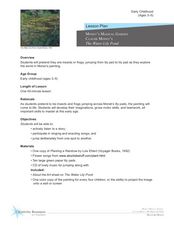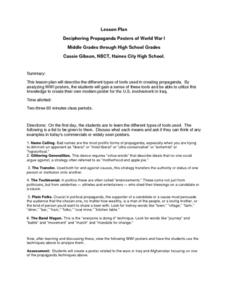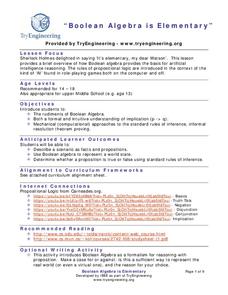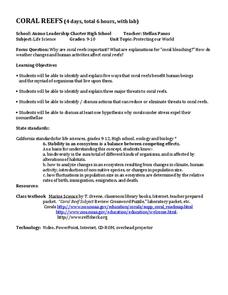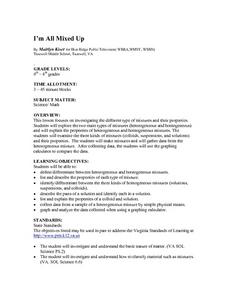Curated OER
Monet's Magical Garden
Students study classic paintings by masters like Monet. In this art history lesson plan, students listen to the story Planting a Rainbow by Lois Ehlert and sing flower songs with the rest of their class. Students examine the painting The...
Curated OER
Technocop
Students explore the role of a police officer while investigating the Microsoft Word program. In this technocop lesson, students examine how to format text using a computer program. Students follow detailed instructions of how to create...
Curated OER
Evaluating Information on Food Labels
What kinds of foods include corn? Corn syrup? Start by viewing a clip of Food Inc. with your middle or high schoolers. Then, study a list of corn-derived ingredients, encouraging your class to see how many food products contain corn. A...
Curated OER
Food and Energy
How many calories are needed each day? What foods have good calories? What happens to calories that don't get used? How many calories are in the different kinds of foods and drinks? How many calories do I need to do a certain activity?...
University of California
You Are What You Eat: Testing for Organic Compounds in Foods
We have all heard that we are what you eat, but what are we eating? An informative lesson opens with a discussion of the foods pupils have recently eaten. Then, young scientists perform four experiments on seven different foods to...
Bill of Rights Institute
Freedom for All?
What did abolitionists have in common with those working for women's rights? How has the Native American struggle for voting rights differed from the struggles of other groups? Class members examine the 15th, 19th, 23rd, 24th, and 26th...
Curated OER
Compare the Presidents
How are Nicolas Sarkozy and Barack Obama similar? How are they different? Look at two visual representations of them; what kind of first impression does they give you? After comparing the presidents, learners complete a proverb matching...
iCivics
Why Government?
Why do people create governments? Where did we get our ideas about government? This is a fantastic introductory lesson for your American government class that begins by reviewing the philosophies of Thomas Hobbes and John Locke in...
Huntington Library
Everyday Life - Exploring the California Missions
Young scholars relive history as they examine primary sources that document everyday life in the California missions. During a class viewing of the included slideshow presentation, children analyze documents, paintings, and drawings in...
Curated OER
Descriptive Writing Using the Book Rumpelstiltskin
Use the fairy tale Rumpelstiltskin to teach your third grade class about descriptive writing. Following a teacher read-aloud of the story, the class brainstorms a list of adjectives describing the main character. Students use this list...
Curated OER
Holocaust and Resistance
Students complete a unit of lessons that examine the Holocaust from the point of view of those who actively resisted the Nazis. They analyze a timeline, participate in a class debate, explore various websites, and write a letter.
Curated OER
Boxes & Blocks: Puffer Bellies and Box Cars
Students turn cardboard boxes into outdoor dramatic play. In this early childhood visual arts lesson, students explore cooperative and dramatic play outdoors by challenging children to create a train from cardboard boxes.
Curated OER
Balls & Hoops : Fun with Balls and Tubes
Learners race to keep these balls rolling. In this early childhood physical education lesson, students experiment with cause and effect as they work with different heights of cardboard tubes.
Curated OER
Deciphering Propaganda Posters of World War I
What strategies are employed when creating propaganda? Your young historians will learn about six different techniques utilized in the construction of political propaganda, particularly in the advertisements of World War I. The...
National September 11 Memorial & Museum
Local Heroes
The cover of The New Yorker magazine sparks a conversation about September 11th and the invaluable sacrifices the first responders made to rescue those in danger. Scholars discuss their observations, thoughts, and feelings then take pen...
TryEngineering
Boolean Algebra is Elementary
See how Boolean algebra relates to video games with a lesson that teaches young scholars how to use Boolean algebra to create rules for a virtual world. They test the rule base for consistency in groups.
Prestwick House
New (March 2016) SAT Writing and Language Test Practice
Prepare class members for the SAT Writing and Language exam with a practice test that prepares students for the types of questions and the kind of language used in the exam. Test takers must select the best way to fix poorly constructed...
PBS
Facts vs. Opinions vs. Informed Opinions and their Role in Journalism
Do reporters write about what they see, or what they think? Examine the differences between investigative writing and opinion writing with a lesson from PBS. Learners look over different examples of each kind of reporting, and convince...
Teaching Tolerance
Civic Engagement and Communication as Digital Community Members
Don't feed the Internet trolls! Using a thought-provoking resource, pupils brainstorm a whole-class list of the possible kinds of bias young people may experience online. Next, in small groups, scholars create posters illustrating how to...
Curated OER
Coral Reefs
Young scholars research coral reefs and identify their benefits to humans, threats to the reef, how to reduce and eliminate threats, and more. In this coral reef lesson plan, students research the reefs, and take a field trip to an...
BBC
Community Action
How does community involvement make good citizens? Use all or a few of the included ideas to foster a better understanding of what it means to be a good citizen. Learners will brainstorm community issues, discuss how to get involved, and...
Curated OER
I'm All Mixed Up
Middle school scientists compare and contrast heterogeneous and homogeneous mixtures. They differentiate solutions, colloids, and suspensions by examining samples of each. Note that the bulk of the lesson plan directs you how to...
Curated OER
Grab Your Reader: Great Leads
Get your readers' attention with this Six Traits of Writing lesson plan. First, young writers draft ideas in an organized manner utilizing words, sentences, and multiple paragraphs. They also use voice to fit the purpose and audience and...
Curated OER
Bugs, Bugs, Everywhere!
Students collect and compare bugs using magnifying lenses and graph data based on their comparisons. In this bugs lesson plan, students also make an aspirator by using a jar, tubing, and screen.


